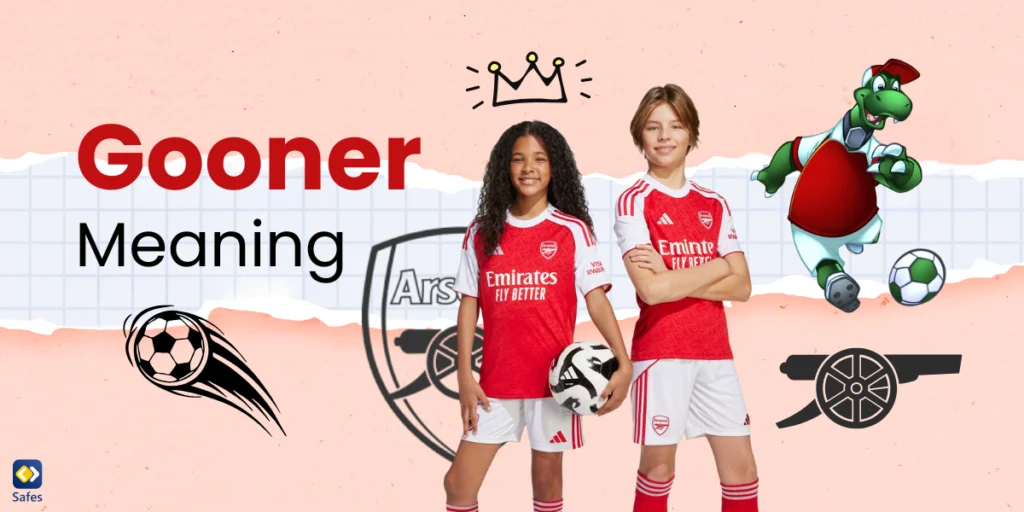The internet changes fast, and so does the way people talk online. New slang terms pop up all the time, and as a parent, it can feel like a full-time job just trying to keep up. One word you may have seen or heard is “Gooner.” But what does gooning mean? Is it harmless, or should parents be concerned? Let’s break it down together in this guide built just for parents.
Download and Start Your Free Trial of the Safes Parental Control App
What Does Gooner Mean?
In 2025, the word “Gooner” has two main meanings, depending on the context:
- Sports Fan Term: Originally, “Gooner” was (and still is) a nickname for fans of the English soccer team Arsenal FC. This meaning is completely safe and innocent.
- Adult Slang Term: However, in online spaces, especially forums or chat rooms, “gooner” can also refer to someone who engages in a specific adult behavior involving long periods of watching explicit content. This usage is not appropriate for kids or teens and is often connected to NSFW (Not Safe For Work) content.
Because of these two very different meanings, the word can be confusing and potentially dangerous if not understood properly.
How It’s Used in Real Digital Interactions
Let’s look at how “gooner” might appear in everyday online chats or posts:
Safe Example (Sports Context):
“Can’t wait for the game tonight! Gooners forever!”
(Translation: I’m a big Arsenal fan and excited about the match.)
Unsafe Example (Adult Context):
“I’ve been gooning all weekend. Can’t stop.”
(Translation: Engaging in explicit content bingeing (Like chronic masturbation); something not suitable for minors.)
These two examples show just how different the same word can be, depending on the digital setting. This is why it’s so important for parents to stay informed and ask questions when unfamiliar words pop up.

Platform-Specific Usage
The meaning of “gooner” can also vary depending on where it’s being used:
- YouTube / TikTok
The term may be used in sports fan communities. Young people might post videos supporting Arsenal and use “#Gooner” as a hashtag. Therefore, gooning meaning on TikTok and Youtube is generally safe.
- Reddit / Discord / Forums
In adult communities, “gooner” often appears in explicit conversations. These platforms allow NSFW content, and the term may be used as part of usernames, subreddits, or inside private chat servers.
- Instagram / Twitter (X)
The term may appear in either context. On public pages, it’s often about football (soccer). In private messages or accounts with mature content, it could signal adult behavior.
As you can see, context is everything. That’s why it’s important to monitor both public and private interactions on your child’s device.
Risk Level Indicator (Parent Alert System)
To help you better understand whether “gooner” is a red flag, here’s our parent alert system:
| Meaning | Risk Level | What Parents Should Do |
| Arsenal football fan | 🟢 Green – Harmless everyday slang. | Safe. No action needed unless it’s distracting from schoolwork. |
| Adult behavior reference | 🔴 Red – Potential safety concerns. | Unsafe. Talk to your child and check their digital activity. |
If you’re unsure of the context, calmly ask your child what the word means to them or where they saw it. Sometimes, a direct and open conversation can clear things up quickly.
Trend Tracker: Is It Still Relevant?
🔥 Trending (widely used now)
The sports meaning remains popular, especially among teenage boys who love soccer. The adult slang meaning has quietly become more common in small online groups, but most people still don’t know about it.
Because of its growing visibility on platforms like Reddit and Twitter, it’s smart for parents to keep an eye on the word, especially when used in usernames, hashtags, or private messages.

Online Safety Considerations
Here are a few safety tips to help you protect your child from inappropriate uses of slang like “gooner”:
- Keep communication open: Encourage your child to talk about the things they see and hear online. Be curious, not judgmental.
- Check search history and apps: See if your child has been searching for terms you don’t understand, or if they’ve downloaded apps that allow private messaging or inappropriate content.
- Use parental controls: These tools can help you filter content, set screen time limits, and monitor activity across apps, so you’re always aware of what’s going on.
- Stay informed: Slang terms evolve. Try to stay updated with current trends by reading blogs (like this one), watching videos made for parents, or joining online parenting forums.
- Create digital boundaries: Set clear family rules around screen time, safe content, and app use. Make sure your child understands what’s appropriate and what’s not.
Final Word
Slang like “gooner” may seem harmless at first, but a deeper look reveals that not all meanings are safe for kids. As a parent, staying aware of these terms and the platforms where they appear can go a long way in keeping your child safe in today’s digital world.
Want an extra layer of protection? Safes is a powerful parental control app designed to give you peace of mind. As a better alternative to Windows parental controls, with Safes, you can monitor apps and internet usage, set healthy screen time limits, block unsafe websites, and get alerts for concerning keywords and phrases.
It’s available for Android and iOS, and you can download it today!
Your Child’s Online Safety Starts Here
Every parent today needs a solution to manage screen time and keep their child safe online.
Without the right tools, digital risks and excessive screen time can impact children's well-being. Safes helps parents set healthy boundaries, monitor activity, and protect kids from online dangers—all with an easy-to-use app.
Take control of your child’s digital world. Learn more about Safes or download the app to start your free trial today!




